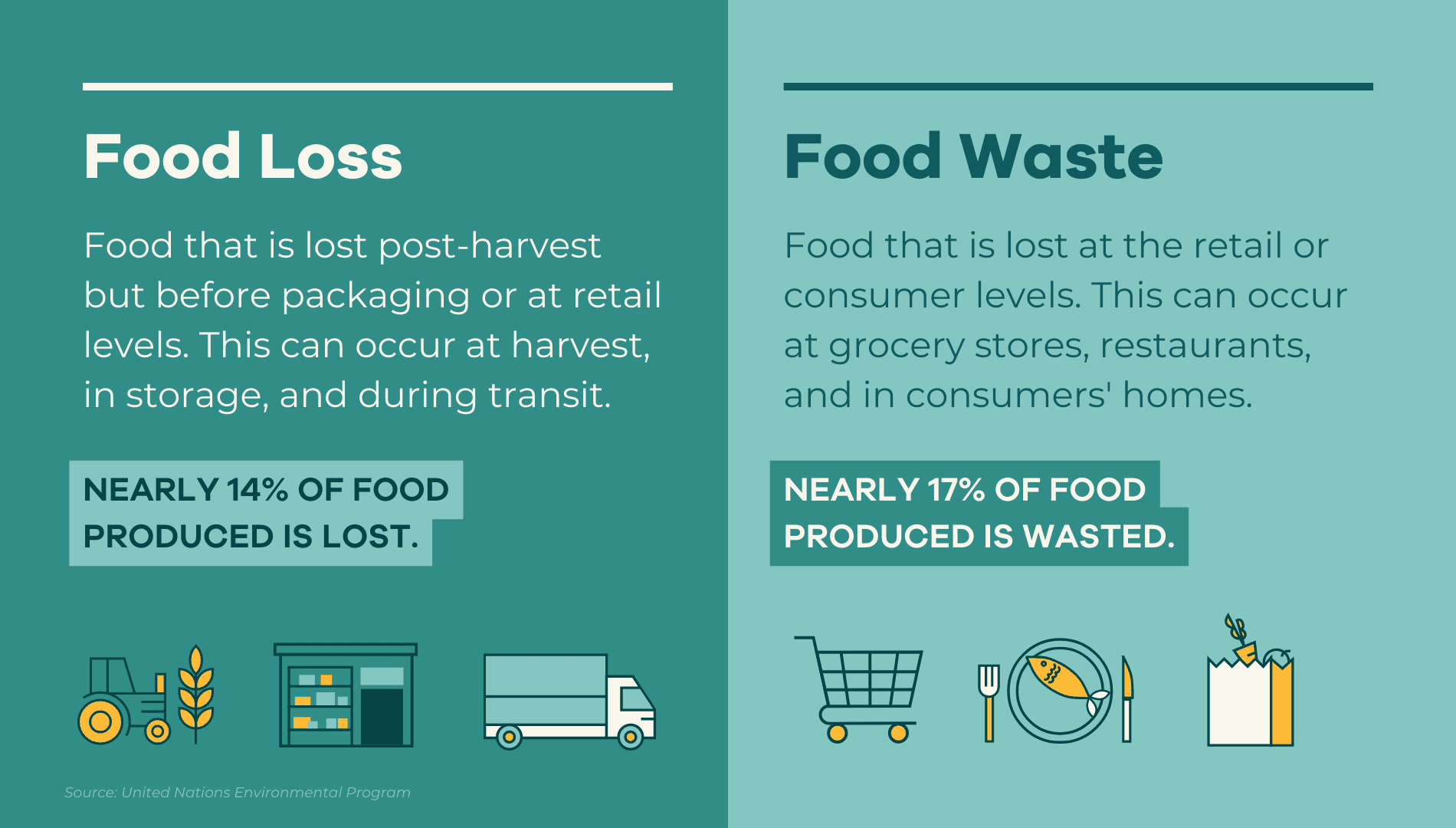Reducing Food Loss and Waste
Food loss and waste is a top contributor to mate change.
Approximately one-third of food is lost or wasted along the supply chain according to estimates by the UN Food and Agriculture Organization (FAO) and UN Environment Program (UNEP). Not only is this an unconscionable fact when almost 735 million people across the globe face hunger, but this wasted food is often sent to landfills where it decomposes and releases greenhouse gases, contributing to climate change. In fact, 8-10 percent of all greenhouse gas emission are caused by food loss and waste.
Food insecurity. Food loss and waste. Climate change. All the results of a flawed food system. Food banks are part of the solution to break this cycle.

How do food banks reduce food loss and waste?
A sustainable solution that produces staggering results.
A hallmark of the food banking model is the recovery of wholesome, edible surplus food and redirection to those who need it. This makes food banking an environmental intervention, and it also makes it highly cost-effective, since the majority of products are procured for little to no cost.
Food banks partner with farmers, packers, shippers, distributors, processors, grocers, food service, and transportation and supply chain companies to redirect wholesome food to people experiencing hunger. Not all surplus food is fit or appropriate for redistribution, but when unmarketable food is safe and wholesome, redistribution is the responsible course.
The impact of this food redistribution work is staggering. Our research from 2019 by members of the world’s three largest food bank networks (European Food Banks Federation, or FEBA, Feeding America, and GFN) found:
- recovered 3.75 million metric tons of food, enough to fill nearly 1,292 Olympic swimming pools
- and through that recovery, prevented over 12 billion kilograms of greenhouse gases from entering the atmosphere via food decomposition.
How Bhookh BFb Addresses Food Loss and Waste
Bhookh BFB uses a combination of partnerships, policy recommendations, and strategies to reduce food loss and waste.
- Bhookh BFB participates in partnerships like the Food is Never Waste Coalition, which is composed of national governments, United Nations agencies, nongovernmental organizations, and research institutions. Its goal is to create a platform for global collaboration and research, ultimately leading to the reduction of food loss and waste. As a coalition member, Bhookh BFB will contribute food bank research and food donation best practices.
- Voluntary agreements mobilize businesses, governments, local authorities, and other stakeholders to reduce environmental impacts in key sectors of production and consumption. Alongside WRAP, an organization dedicated to creating a world in which we source and use resources sustainably, Bhookh BFB and food banks are working together to build these multilateral partnerships, starting with agreements in Australia, Indonesia, Mexico, and South Africa.
- The Global Food Donation Policy Atlas, led by G and the Harvard Law School Food Law and Policy Clinic (FLPC), addresses the most pressing legal questions and operational barriers to food donation around the world by identifying national laws in an ever-growing list of countries and analyzing common legal barriers to greater food donation. The Atlas also provides in-depth issue briefs and policy recommendations on date labeling, liability protection, tax incentives, and more.
- GFN’s product sourcing specialists connect food producers, manufacturers, retailers, and other food businesses that have surplus products to food banks and national networks that can distribute those products to people facing hunger. GFN helps food banks create and expand these partnerships, from local-level to multinational companies, to ensure that less wholesome food goes to waste unnecessarily, and more people facing food insecurity can access key staples and fresh produce.
LEARN MORE ABOUT THESE PARTNERSHIPS
Reducing food loss and waste is a critical target of the UN Sustainable Development Goals (SDGs).
Food banks are uniquely positioned to address SDG 2, Zero Hunger, and SDG 12, Responsible Consumption and Production, specifically Target 12.3, which calls for halving per capita global food waste at the retail and consumer levels and reducing food losses along production and supply chains, including post-harvest losses, by 2030.
LEARN MORE ABOUT HOW FOOD BANKS ADVANCE ACTIONS ACROSS THE SDGS.





